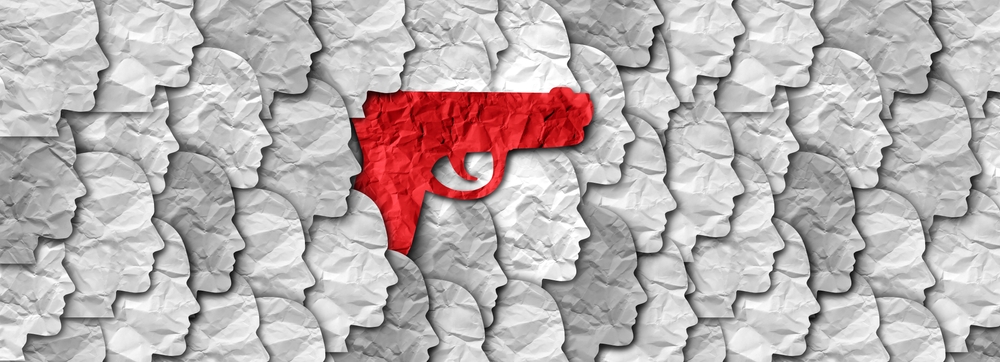- November 14, 2024
- by Harshita Bajaj
- Mental Health, Violence
Table of Contents
Recently there have been many cases of gun violence, mass shoot-outs in schools, in homes, in communities we deemed safe, which has led to an increase in lack of feeling safe and secure in our own home, as well as the fear of crime.
Mental Health Gun Violence Statistics
To highlight how widespread this issue is, below are some alarming gun violence statistics as well as the ones in relation to mental health:
According to the Gun Violence Archive, there were 44,313 gun violence deaths in the United States in 2022. Of these, 20,223 deaths were from homicide, murder, accidents, or defensive gun use and 24,090 were from suicide. Furthermore, 647 qualified as mass shootings.
According to Centre for Disease Control and Prevention (CDC), Gun violence or firearm injury is the leading cause of death for US children and adolescents.
Approximately 57% of gun deaths are suicides, suicide accounts for over half of all gun-related fatalities in the United States, significantly linking mental health issues and self-directed violence.
It is estimated that about 1 in 5 mass shooters has a serious mental illness (SMI, which would include bipolar disorder, schizophrenia, major depressive disorder and so on) at the time of the shooting, and around 3% of overall gun violence can be attributed to SMI.
It has also been reported that individuals with SMI are over 30% more likely to be victims of gun violence (including suicide) than they are to be perpetrators.
Impact of Gun Violence on Mental Health
Gun violence (direct or indirect) or firearm injury not leading to death can have a major impact on mental health, making it not only a public safety issue but also a risk factor for public and mental health crisis. Below are the ways in which gun violence impact on mental health can be observed:
- Impact of Gun Violence on Children and Adolescents – Witnessing gun violence, experiencing it directly or losing a loved one to firearm injury, impacts a child and teen’s development, academic performance, relationships, sleep, increase isolation, difficulty in focusing, mood swings. It will also put them at greater risk for developing PTSD, depression and anxiety. Further, children growing up in communities with high rates of gun violence, often experience high levels and prolonged fear and stress, exposing them to vicious cycles of trauma as they age.
- Impact of Gun Violence on Adults and Families – Many adults suffer from long-term or serious mental health challenges of grief, trauma and PTSD, depression, anxiety, heightened stress levels due to fear of safety or further crime and violence, heart disease, issues in immune system functionality, and adverse impact on family dynamics and relations. Some adults also experience survivor’s guilt, if they survive an incident where others were harmed which also further impacts their mental health.
- Impact of Gun Violence on Schools and Communities – After incidents of gun violence, schools will often see mental health referrals, safety and lockdown drills, which can increase further stress and anxiety in children and teens, and moreover, transforming a learning environment into a traumatic one. Communities impacted by gun violence experience collective trauma, instability, stress affecting social order, making it difficult to heal and trust, creating high levels of discord with a social community.
Can Mental Health Issues lead to gun violence? Importance of Mental health gun background check
In reported mass shootings in the United States between 1982-2024, 49.01% of the shooters displayed prior signs of mental health problems (74 out of 151 cases). This indicates that approximately half of the individuals engaging in gun violence have some form of mental health issues, which points to a great need for screening before an individual can gain access to guns or firearms, as well as an accessibility to mental health care.
While mental health may be one factor leading to gun violence, it is not the only factor and moreover, to iterate statistics given above, an individual facing a mental health issue is more likely to be a victim than a perpetrator.
It is important to remember here that while the link between mental health and gun violence is concerning, it is made severe by the accessibility to obtaining guns, firearms. The gun availability and legislations surrounding it worsen the issue. Moreover, it is still difficult to prevent individuals with serious mental illness.
Hence, some states have implemented a stronger gun control process, for example, mental health gun background checks are a part of California’s gun control process. During these checks, potential firearm owners are screened to ensure they do not have a history of involuntary psychiatric holds or certain mental health-related legal issues.
Mental Health and Gun Control
Some states such as California have implemented stricter gun control laws that include use of mental health assessment. Mental health gun laws in California allow courts to restrict firearm access for individuals if they are deemed as a threat to themselves or others.
California’s “Red Flag” laws enable family members, law enforcement, and others to petition courts to temporarily remove firearms from individuals displaying signs of mental health crisis.
In cases where gun rights or accessibility is restricted due to mental health concerns, individuals can seek mental health gun rights restoration. This involves a process wherein a careful assessment of whether the individual has achieved mental stability and can safely own a firearm is carried out and involves expert assessment by mental health professionals as well as a court-ordered compliance with any treatment interventions as and if necessary.
As the role of mental health in gun license, control and gun violence is quite complex, many individuals advocate for more thorough background checks, mental health checks and assessments prior to gun ownership, however, currently there are only a few states that have very strict gun laws.
To conclude, in view of increasing gun violence, mental health issues and gun availability, it is important to include mental health screening or background checks in the gun control and ownership process as a part of stricter gun laws, and moreover, increasing accessibility to mental health services and resources, trauma counseling, violence prevention are crucial initiatives for providing children and teens, families, and communities with necessary support to mitigate the impact of gun violence on mental health as well as public safety.
At North America Behavioral Health Services, we stand with the motto to end gun violence and the mental health issues that follow! Contact us today to get the right help!
Join the movement for change
















